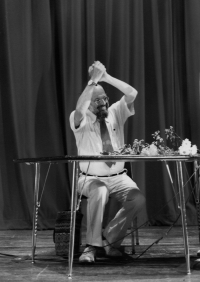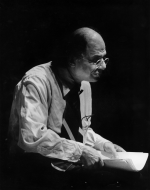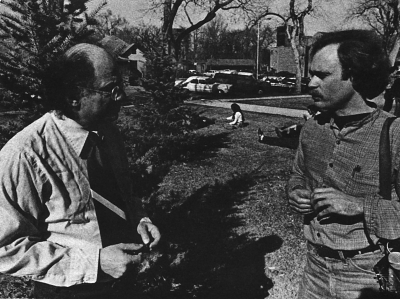 Holy “Blake-light tragedy among the scholars of war!” it’s the fiftieth anniversary of “Howl” today. John McChesney just had a piece on NPR, talking with Ferlinghetti and Robert Hass.
Holy “Blake-light tragedy among the scholars of war!” it’s the fiftieth anniversary of “Howl” today. John McChesney just had a piece on NPR, talking with Ferlinghetti and Robert Hass.
A complete coincidence, this morning I read along with a brave halting rendition of the poem by a quiet, normal-looking, probably a Southern Baptist, non-major undergrad. She carried on unflinchingly through the foreign, unknown, and bad words, having chosen the poem as the one she would read aloud in class. She’d been drawn to it by its “interesting language,” she said, so we lingered a bit over the hydrogen jukebox and the bop kaballah.
Thirty-five years ago in the meditation room of his East 10th Street apartment, Allen Ginsberg instructed me not to turn away so quickly from a poster-sized version of the My Lai massacre tacked to the wall. “Look at it,” he said—“it’s you.”
A decade later, March 29, 1981, about twenty-four hours before the attempted assassination of Ronald Reagan, Ginsberg campaigned in Fort Collins, Colorado, against its Rocky Flats, which daily manufactured three plutonium warhead triggers for thermonuclear weapons, each trigger packing the wallop of the Hiroshima bomb so it could detonate a weapon about a thousand times more explosive than the bomb that destroyed Nagasaki.
I cornered him backstage, and recalling that heap of gunned-down Vietnamese women and children on his wall ten years earlier, I wondered aloud if we’d learned anything.
Allen Ginsberg: “Well, did we learn anything from Christ? Apparently the Moral Majority learned nothing about forgiveness of sin and friendliness and basic charity and compassion and the innocent lamb. They’re among those who blather most about Christ and hide under his name. They are diabolical in terms of believing in mass murder and war and crucifixion of the lamb and capital punishment. How come we didn’t learn from ourselves? Or history? We can’t remember what we learned ten years ago in Vietnam. The reason is addiction to petrochemical energy—shooting a lot of cocaine nuclear energy and amphetamine gasoline energy, so the whole nation’s become a speed freak. You can see it in the eyes of General Haig as he glitters, talking double-talk in Congress, saying there’s something worth fighting for. It’s the kind of thing you seen in bars when somebody comes in challenging everybody to a fight and saying he’s number one.
“People are still passionately interested in themselves and their own nuts and bolts and eyeballs, and ignorant of what’s going on around the world and the suffering of other people…sitting in front of the TV looking at all those lies all the time. It leads to people hitting each other because they can’t figure out what’s going on.
“Now there is the possibility, with Haig and Reagan and all their people, with all the big business like Coors, Vicks VapoRub, Sears, Exxon, Sun Oil, the Mellon family running foundations that are subsidizing right-wing think tanks and magazines and TV stations and single-issue propaganda networks—there’s a possibility, given the overload of money going to the military, that we will turn into a military dictatorship just like El Salvador. The forty-two million cut from the arts budget of the National Endowment is less than what the Pentagon spends on brass bands, according to Newsweek magazine. The big dumbbells in power now think they were voted in by a majority—really people were just too bored to vote, and there was so much loudmouth electronic propaganda paid for by big corporations. The media belongs to the rich—government by the rich.
William Ryan: “So, then, what if we stood now at the intersection of politics and poetry—what poetic landscape would we see from there?”
AG: “Invent your own poetics—invent yourselves. [William Carlos] Williams says, ‘A new world is only a new mind.’ I’m obsolete and bankrupt in the sense that I’m tied to old leftist ideas and old gay ideas and sixties’ ideas and meditation…. Probably there’s a whole new wave, through punks and beyond, that doesn’t have the same allegiances and that has a fresh view. I’d be interested in seeing what they do—like The Clash—I bought their album the other day.”
WR: “What’s there, in the punk landscape?”
 AG: “The very frank statement of the planet condition by the Sex Pistols amazed me when they sang, ‘No future for you, no future for me.’ It’s exactly what people thought unconsciously—just like people were thinking in the sixties when Dylan sang, ‘You’ve thrown the worst fear that can ever be hurled, the fear to bring children into the world.’ It’s just that somebody finally said it. So, I think that The Clash, with their Sandinista album and songs like “Washington Bullets,” is making a clear statement.”
AG: “The very frank statement of the planet condition by the Sex Pistols amazed me when they sang, ‘No future for you, no future for me.’ It’s exactly what people thought unconsciously—just like people were thinking in the sixties when Dylan sang, ‘You’ve thrown the worst fear that can ever be hurled, the fear to bring children into the world.’ It’s just that somebody finally said it. So, I think that The Clash, with their Sandinista album and songs like “Washington Bullets,” is making a clear statement.”
WR: “Have you heard The Dead Kennedys, their song “California Über Alles,” which is an attack on…”
AG: “But ambivalent. It’s an attack on Jerry Brown [then Democratic Governor of California] or something. Why bother attacking Brown? That’s where the self-defeating irony comes in?”
WR: “In an interview, Jello Biafra of The Dead Kennedys alluded to growing up in Boulder [Colorado]. He described Boulder as organic Disneyland, referring maybe to all the healthy optimists, the organic granola-heads out in the sunshine…”
AG: “But why start with Brown, who is relatively intelligent and may actually listen to them and would probably agree with their attack? However, I guess it cuts both ways.”
WR: “In The Fall of America, you list some well-known dissidents and the actions that were taken against them—Jerry Rubin, Tim Leary, Leroi Jones, Dr. Spock, Eldridge Cleaver…. You wrote, in reference to Leary, ‘Shut up or else/Loonybin or slam.’”
AG: “They were threatening to put him in the loony bin or slam if he didn’t stop talking about LSD. They did put him in the slam—for talking.”
WR: “I interviewed Leary a few years ago…”
AG: "Did he bullshit a lot? There’s an element of happy bullshit."
WR: “He said a lot of things during the two-hour session, but I ‘m thinking about—and maybe it is the element of happy bullshit, or the trickster in him going for the oblique approach—but he said that what we should send to Third World nations are American cosmetics, because that’s what they really want. They want lipstick. I had the feeling he was addressing something about the kinds of desires that are introduced, established, and then exploited. I wonder if he was trying to hack through to our presumptions about what they need—you know, in Third World they want to look nice, just as we do, since that’s important in the established order of desires, while we presume that with their first American-aid dollar they should go out and by whole wheat bread—but what they want is what we have—luxuries, white bread, glitz and glitter, eye shadow, designer jeans…”
AG: “I don’t understand his thinking.”
WR: “Have you changed the way you talk publicly about dissident ideas? Do you feel a need to be more oblique? Have you been threatened—I mean, to keep your mouth shut?”
AG: “No, not me. Well, yes, but I mean not armed threat. There have been attempts to set me up to put me in jail by the narcotics bureau back in the sixties, and I’ve been put on subversive lists and strip-searched when I come in and out of the country. But Leary—they had him in the slam for four years, and nobody knows what happened to him there. They used a lot of double agents on him over the years. And he got terrible treatment by Gordon Liddy. [G. Gordon Liddy was the chief operative for President Richard Nixon’s White House Plumbers unit. Liddy masterminded the first break-in of the Democratic National Committee headquarters in the Watergate building in 1972. Liddy’s radio talk show is now syndicated in 160 markets and on both Sirius Satellite Radio and XM Satellite Radio stations. He has also been a guest panelist for Fox News Channel.] Liddy got his career started by prosecuting and persecuting Leary illegally. He went to Algeria where he was in the company of Eldridge Cleaver, and there were black CIA agents and agent provocateurs in Cleaver’s drawing room, according to The New York Times and the Church Committee Report.
“I don’t think people realize how enormous the effect of secret agents was in keeping disinformation going and discrediting the anti-war movement.
 “I read in the paper that this whole White Paper about communist guns to El Salvador is a huge disinformation, which if so, is a scandal of tremendous proportions. That’s what they did in Vietnam—fabricated blood baths. Now, in El Salvador, we don’t want them to go communist, but, by opposing them and by cutting off aid, we’re going to drive them into communist hands, and they don’t want to go communist, but we’re acting so paranoid and like such bullies that we’re making it impossible for them to get rid of their dictatorship without communist help, and then we’re accusing them of having communist help.
“I read in the paper that this whole White Paper about communist guns to El Salvador is a huge disinformation, which if so, is a scandal of tremendous proportions. That’s what they did in Vietnam—fabricated blood baths. Now, in El Salvador, we don’t want them to go communist, but, by opposing them and by cutting off aid, we’re going to drive them into communist hands, and they don’t want to go communist, but we’re acting so paranoid and like such bullies that we’re making it impossible for them to get rid of their dictatorship without communist help, and then we’re accusing them of having communist help.
“Most of the mail going to the White House is against the Haig policy. There’s a basic difference between traditional American constitutional principles and ideals, and the heavy autocracy that the United States is promoting in El Salvador. There’s a basic conflict and flaw and schizoid split in the entire philosophy of the conservatives. They’re saying, get the government off our back but they’re putting more government on our backs in the form of secret police and army. They’re saying, cut the budget but they’re expending the public debt in order to feed the military.
“I think they’ll be voted out in the next election. They’re already discredited by their own behavior. They only way they could stay in power is if they were able to get a police state going, to deny people the right to vote, or so overwhelm the media with government-subsidized propaganda that people get completely confused.
“They made a big media deal about the hostages, and they followed with a big media deal about El Salvador. Then the media got on to it and began real reporting, which is to say that most of the mass assassinations in El Salvador were done by our own [installed] right wing, U.S.-armed government. Then the White House began saying, you guys are paying too much attention to El Salvador. What if they got on this trip to say the media is trying to discredit the government and the media’s all wrong about El Salvador and there should be some censorship?
“There are liars and creeps and bunglers on both sides, so the only thing you can do is not get tangled in everybody’s rationalizations, including your own. And for that I would recommend meditation practice to get untangled from your own rationalizations, and that’s why I’m around Naropa Institute, trying to bridge the gap between poetry and meditation practice. That seems to make more sense than getting into fights with Reagan or the communists or the leftists or the rightists.”







